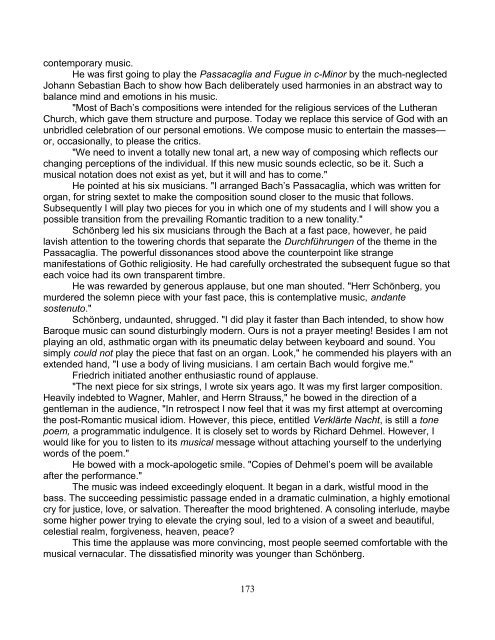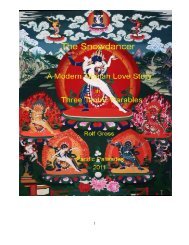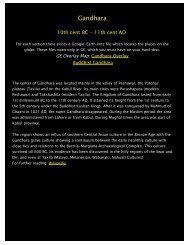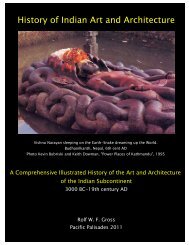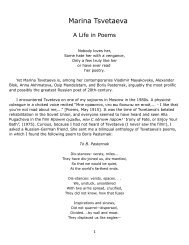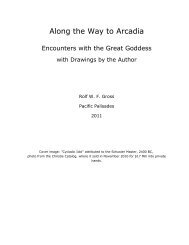- Page 2 and 3:
Konrad and Alexandra The Chronicle
- Page 4 and 5:
24.The Dahl's House, Katharina, 190
- Page 6 and 7:
One piece of luggage after another
- Page 8 and 9:
I sank into a restless sleep and th
- Page 10 and 11:
jokes. Fifteen years ago Leist had
- Page 12 and 13:
goats, and driven from behind by sh
- Page 14 and 15:
two of us." Tiflis 1898 Tiflis and
- Page 16 and 17:
comprehension that fortune had sent
- Page 18 and 19:
Wine Merchants, Tiflis Bazaar, 1890
- Page 20 and 21:
I can never completely shake off vi
- Page 22 and 23:
couches. They were given big towels
- Page 24 and 25:
Alexandra Dadiani Tiflis 1898 She w
- Page 26 and 27:
Dadiani laughed so heartily that Ko
- Page 28 and 29:
eally introverted. We love tragedy,
- Page 30 and 31:
"Konrad, come and join us, it must
- Page 32 and 33:
Chekhov's "Chaika" and Henri the Go
- Page 34 and 35:
He handed her the necklace. She str
- Page 36 and 37:
curtain. Konrad, raised on the clea
- Page 38 and 39:
Henry nodded. "I know what you mean
- Page 40 and 41:
"I know you feel overawed by the ta
- Page 42 and 43:
Alexandra's Necklace Konrad’s emo
- Page 44 and 45:
Georgia on Horseback 1898 Konrad’
- Page 46 and 47:
Konrad laughed. "That was exactly w
- Page 48 and 49:
came from the desert, a jackal or a
- Page 50 and 51:
Around the white cathedral that tow
- Page 52 and 53:
The Engagement Konrad and Alexandra
- Page 54 and 55:
find the love she needed. He had pu
- Page 56 and 57:
The half hour ride took them up a v
- Page 58 and 59:
After the dance ended, a deep silen
- Page 60 and 61:
Ilia Chavchavadze, Tiflis, 1900 (Wi
- Page 62 and 63:
Irakli raised his glass. "Do bury t
- Page 64 and 65:
New Year 1899 The jeunesse d’oré
- Page 66 and 67:
"May I look at your watch? What is
- Page 68 and 69:
possibility of a physical abduction
- Page 70 and 71:
well in Telavi, return tomorrow. A
- Page 72 and 73:
Alexandra described the sequence of
- Page 74 and 75:
It was Easter night. On his last vi
- Page 76 and 77:
hoarsely, "Mein Gott, you are right
- Page 78 and 79:
sharply. Konrad smiled. "We left he
- Page 80 and 81:
that no publisher would touch the m
- Page 82 and 83:
The Last Feudal Wedding in Kakheti
- Page 84 and 85:
Alexandra sees in me. A remarkably
- Page 86 and 87:
Alexandra had phonetically translit
- Page 88 and 89:
"Listen my love, try to lie absolut
- Page 90 and 91:
over dark waters to an undisclosed
- Page 92 and 93:
The Wolfsons Fiesole and Florence 1
- Page 94 and 95:
anecdote: my brother studied theolo
- Page 96 and 97:
vanishing lines. They are not shown
- Page 98 and 99:
Alexandra tried to compare both pai
- Page 100 and 101:
Sisakians, she found, disconcerted,
- Page 102 and 103:
existed no viable political alterna
- Page 104 and 105:
Russian aristocrats are blind or si
- Page 106 and 107:
The ball became a great, albeit con
- Page 108 and 109:
He was not interested in controllin
- Page 110 and 111:
would have fainted." Niko laughed.
- Page 112 and 113:
women as you are now. His skill suc
- Page 114 and 115:
erated him. Had he not himself said
- Page 116 and 117:
Otto's Birth 1900 At four in the mo
- Page 118 and 119:
at the height of the contraction sh
- Page 120 and 121:
today you look even more gorgeous."
- Page 122 and 123: Alexandra had waited for him and fi
- Page 124 and 125: The Gulf of Finnland near Lisi Nos
- Page 126 and 127: Count Nikolai Prshevalsky had broug
- Page 128 and 129: The entire ground floor had been op
- Page 130 and 131: She finally learned to distinguish
- Page 132 and 133: pouring out of the palais, the elec
- Page 134 and 135: Indian Masters were fabricated by h
- Page 136 and 137: Berlin 1904 Alexandra had received
- Page 138 and 139: pretty women. They are hanging on S
- Page 140 and 141: He pointed at a monument everybody
- Page 142 and 143: Rheinsberg 1904 They traveled by tr
- Page 144 and 145: under Friedrich’s eyes. Friedrich
- Page 146 and 147: off her horse, and embraced her. Ar
- Page 148 and 149: lethargy and got me into this adven
- Page 150 and 151: "Look, I will give you a recipe for
- Page 152 and 153: The Dahl's House Katharina Weisshub
- Page 154 and 155: know in medicine of when these days
- Page 156 and 157: "I urgently need some new clothes a
- Page 158 and 159: They went to the late show in an ol
- Page 160 and 161: irresponsibly than ever. Instead of
- Page 162 and 163: those of Soranus and the plants Ale
- Page 164 and 165: available to the women of the twent
- Page 166 and 167: asked Alexandra with her cool dark
- Page 168 and 169: She glanced furtively at Katharina.
- Page 170 and 171: "You guessed right," she said in Ge
- Page 174 and 175: "It describes Wagner arriving at th
- Page 176 and 177: the cello, a red rectangle driven b
- Page 178 and 179: Had Herr Schönberg or Herr Webern
- Page 180 and 181: scores? She had not heard either ye
- Page 182 and 183: Fashing Munich 1905 Once a year Dio
- Page 184 and 185: cuirass. The audience watched breat
- Page 186 and 187: They sank into each other’s arms.
- Page 188 and 189: They woke up late next morning. Kon
- Page 190 and 191: Walking on Ice After the cold and f
- Page 192 and 193: in the shadows, and green edges aro
- Page 194 and 195: Germany an alternative. He surely d
- Page 196 and 197: Professor Dahl began to laugh. "I s
- Page 198 and 199: Friedrich and Katharina get married
- Page 200 and 201: Alexandra was the first to notice t
- Page 202 and 203: arena. Aïda in the immense Roman o
- Page 204 and 205: Fiesole 1905 "Walter, we have not s
- Page 206 and 207: Last time Walter had taken her to t
- Page 208 and 209: Alexandra's Time "Friedrich," said
- Page 210 and 211: points I felt the eyes of the Gods
- Page 212 and 213: Meeting Clara Westhoff München and
- Page 214 and 215: "I rented the large dining hall and
- Page 216 and 217: Despite the scarf, Alexandra could
- Page 218 and 219: adoration of her bizarre beauty. Ev
- Page 220 and 221: and do not flush in breathless wave
- Page 222 and 223:
Snowbound in Eydtkuhnen 1905 "Konra
- Page 224 and 225:
the platform. Someone unrolled a re
- Page 226 and 227:
The von Bredow's Snow Casle From be
- Page 228 and 229:
They tiptoed downstairs and along t
- Page 230 and 231:
Return to St. Petersburg 1905 Konra
- Page 232 and 233:
power and calls for the establishme
- Page 234 and 235:
taken Rilke’s abandoned wife alon
- Page 236 and 237:
And her narrow hand in rings. "Ever
- Page 238 and 239:
They had, one day, swum out to a lo
- Page 240 and 241:
impression on us, you have to conce
- Page 242 and 243:
his best to bring some kind of stab
- Page 244 and 245:
Uncle Muravi's Benz Tiflis 1907 "Ma
- Page 246 and 247:
you have ever known me. Can’t you
- Page 248 and 249:
after me. I would have liked to bri
- Page 250 and 251:
From the very beginning little Soph
- Page 252 and 253:
like he: They look at someone and k
- Page 254 and 255:
long ride with Claudia and her pare
- Page 256 and 257:
In the evening, alone with Dahl and
- Page 258 and 259:
maternal rule?" Alexandra burst out
- Page 260 and 261:
hair and build. Cousin Tamara was t
- Page 262 and 263:
along, which I will tie to the pers
- Page 264 and 265:
I could live just as well in Svanet
- Page 266 and 267:
suspected to suffer from tuberculos
- Page 268 and 269:
The dinner feast became a grand aff
- Page 270 and 271:
things." Alexandra surprised Shalva
- Page 272 and 273:
cut the bread effigy into small pie
- Page 274 and 275:
her hands during her examination. W
- Page 276 and 277:
Adishi Gocha Teaching Dream Work Ad
- Page 278 and 279:
talked to me during the night, but
- Page 280 and 281:
Ilia Chavchavadze's funeral train a
- Page 282 and 283:
Their slightly feminist-tinged conv
- Page 284 and 285:
he spent six hours with her and twi
- Page 286 and 287:
and patience are most important. A
- Page 288 and 289:
strokes on large pieces of newspape
- Page 290 and 291:
while Izabel became their quietly d
- Page 292 and 293:
ankles, this très-solide, yet well
- Page 294 and 295:
in 1907! At first, this fact and th
- Page 296 and 297:
my company. Together, we could have
- Page 298 and 299:
covered with faded, dark-red plush,
- Page 300 and 301:
not sell me this painting, I will d
- Page 302 and 303:
Konrad in China 1911-1912 In Octobe
- Page 304 and 305:
father is very impressed by your so
- Page 306 and 307:
Niko. "You asked me what would happ
- Page 308 and 309:
teachers of the great Medresses in
- Page 310 and 311:
The patient, an old man suffering f
- Page 312 and 313:
Konrad's Return from China St. Pert
- Page 314 and 315:
which I did not understand. When I
- Page 316 and 317:
Konrad dug a thick, battered sketch
- Page 318 and 319:
everybody. "Konrad, will you let me
- Page 320 and 321:
Alexandra let out a peal of laughte
- Page 322 and 323:
Alexandra's Journey to Munich 1913
- Page 324 and 325:
ediscovering the old sympathies. Pe
- Page 326 and 327:
Dahl's Examination of Alexandra Mun
- Page 328 and 329:
in Svaneti may not have been perman
- Page 330 and 331:
"My shadow-soul flies into an embra
- Page 332 and 333:
Ever since Claudia’s outbreak in
- Page 334 and 335:
A Visit to Kandinsky Murnau 1913 Al
- Page 336 and 337:
sexual arousal, dance rhythms, and
- Page 338 and 339:
He invited them to dinner in the vi
- Page 340 and 341:
any thought to. A group of children
- Page 342 and 343:
Petersburg. They will have a simple
- Page 344 and 345:
you smile meekly and remain silent.
- Page 346 and 347:
herself to sleep. With the last mai
- Page 348 and 349:
of his faithful. One night around t
- Page 350 and 351:
ead and the resignation of the Empe
- Page 352 and 353:
Vladimir gulped down his glass of v
- Page 354 and 355:
Their Flight to Georgia May 1918 In
- Page 356 and 357:
It was an unreal night, the scare a
- Page 358 and 359:
negotiate the bad mountain tracks.
- Page 360 and 361:
was very much of her own mind. Meli
- Page 362 and 363:
director at the hospital until the
- Page 364 and 365:
Kräuterfrau, a herbalist in the Ge
- Page 366 and 367:
He paused and took a sip from his g
- Page 368 and 369:
German Troops in Tbilisi 1918 - 191
- Page 370 and 371:
would crown the tombstone on his gr
- Page 372 and 373:
we are late." "Tell me what was you
- Page 374 and 375:
adventure on that German ship to Ha
- Page 376 and 377:
"Friedrich, who was a very successf
- Page 378 and 379:
Alexandra’s diminutive scribble w
- Page 380 and 381:
The snotty character in the shaft-b
- Page 382 and 383:
final reckoning with Georgia. Withi
- Page 384 and 385:
again war was raging behind the mou
- Page 386 and 387:
She undid it and let it flow into m
- Page 388 and 389:
ut she did not explain why―a Sufi
- Page 390 and 391:
weeks among the obscurer Greek writ
- Page 392 and 393:
A List of people "Konrad and Alexan
- Page 394:
Sources Little information exists o


